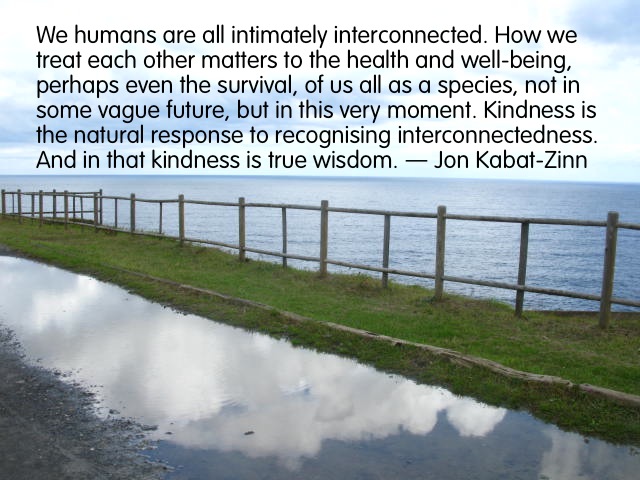How do you get from mindfulness to human rights? A more appropriate question for me is “how you don’t?”. All the attempts to separate our inner world from the world out there may be soothing, but deny our fundamental interconnectedness with one another, and are mostly disappointing in the long run (you can read more about Why self-care is not enough here).
Staff care and human rights
I notice that something hoped for but unexpected has been happening in my work: I go into an organisation as a psychologist to strengthen resilience and prevent burnout in the staff, and the next thing I hear are people having conversations about ‘rights’ not about ‘mental health’ or ‘staff care’. This is because most of the issues that create dysfunctional work environments have nothing to do with ‘mental health’, rather they tend to stem from a lack of mindfulness and emotional intelligence.
When we use labels such as burnout, compassion fatigue, vicarious traumatisation, we are often “medicalising human suffering”. That’s an easy and ineffective way to remove the problem. Here’s an idea and a challenge: instead of labelling individuals and giving them sick leave (in the best case scenario), how about reflecting on the experience that people have day in and day out at work?
What is your experience?
“It took me 15 months to recover from the way I was treated by the NGO I worked for” told me an aid worker.
“When I returned home from my mission I was suicidal. The organisation treated me in a horrible way” were the words of a professional employed by a well-respected INGO.
“[In the organisation there is] an unnecessary complicated way of working which mainly focuses on complying with rules, regulations and procedures rather than on ensuring or facilitating actions leading to changes for the beneficiaries” writes to me a field manager.
Staff care is a much more serious business than some stress reduction training, counselling or minimum standards. It is about how employees experience the organisation on a day to day basis. What we experience in the organisation, is what we give it back to the communities we work with.
Do you experience an open and transparent work environment, where differences are met and explored, conflicts addressed, people cared for and learning possible? Or is it a closed fortress that reproduces the same power structures that we observe in the society we purport to develop/change/improve/transform/empower?
Mindful organisations
Nonprofit organisations have too often felt that anything to do with workers’ rights belonged to the (evil) world of corporate business, where without protection from the law people would otherwise be exploited. Something that would never happen among do-gooders! Well, it’s now time to turn the mirror towards ourselves, because what we see in the nonprofit – working 24/7, unpaid work, no contracts, people left wondering what will be next after years of service, no guarantees in between assignments, a sacrifice mentality, no time and space for reflection – is what burns people out, breaking trust within the organisation, and with the communities we aim to engage with.
The connection and interdependence between internal health (or dysfunction) and external impact is pure common sense, in the same way we understand that a sick tree will not bear healthy fruits. But we seem to be blind to it because it is easier to blame failure on the complex social and political situations that we face in the field, than to take some responsibility for it.
Mindful organisations are caring and learning communities that enable, rather than constrain change – both within and without. And that requires much more than a technique, it’s an ongoing practice where we dare to explore new territories, make mistakes and leave behind the idea that “it is better to fail conventionally than to succeed unconventionally” (my favourite quote from the book Aid on the Edge of Chaos).


